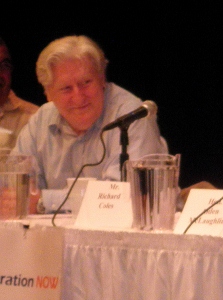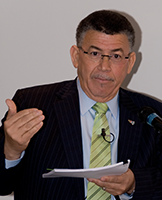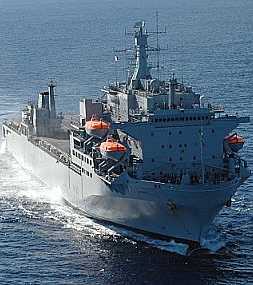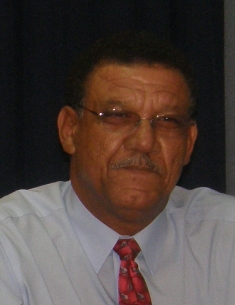Archive for August 10th, 2012

Man charged with murder
 (CNS): Police confirmed Friday afternoon that a 27-year-old man from West Bay has now been charged with the murder of Robert Mackford Bush last September. The man, who is expected to appear in court on Monday morning, has also been charged with possession of an unlicensed firearm. He was arrested on Tuesday following a police operation in West Bay almost a year after Bush was shot and killed in a gang-related killing that triggered a tit-for-tat spree of murders, which police said centre on the ongoing feud between two district gangs. Bush was shot while sitting in his car at the junction of Capt Joe and Osbert Road and Birch Tree Hill on 13 September 2011.
(CNS): Police confirmed Friday afternoon that a 27-year-old man from West Bay has now been charged with the murder of Robert Mackford Bush last September. The man, who is expected to appear in court on Monday morning, has also been charged with possession of an unlicensed firearm. He was arrested on Tuesday following a police operation in West Bay almost a year after Bush was shot and killed in a gang-related killing that triggered a tit-for-tat spree of murders, which police said centre on the ongoing feud between two district gangs. Bush was shot while sitting in his car at the junction of Capt Joe and Osbert Road and Birch Tree Hill on 13 September 2011.

Professor warns of major flaws in local economy
 (CNS): An academic and former civil servant who is an expert in business and economics has warned of the deep-seated flaws and problems with the Cayman Islands economy that government needs to address in the long term. Professor Robert Weishan, Chair of Business Studies at UCCI, pointed out that the government had become the almost exclusive employer of the middle class in Cayman. He said that the country’s enormous dependence on tourism and financial services meant there were very few jobs for regular middle class locals and this was why government was plugging the employment gap that should be filled by the private sector.
(CNS): An academic and former civil servant who is an expert in business and economics has warned of the deep-seated flaws and problems with the Cayman Islands economy that government needs to address in the long term. Professor Robert Weishan, Chair of Business Studies at UCCI, pointed out that the government had become the almost exclusive employer of the middle class in Cayman. He said that the country’s enormous dependence on tourism and financial services meant there were very few jobs for regular middle class locals and this was why government was plugging the employment gap that should be filled by the private sector.
“Even if we meet the immediate problems we still need to address the flaws in the economy which is far too concentrated on financial services and tourism as well as construction, which depends almost entirely on the other two. Cayman is not able to generate real middle class jobs in the private sector so it is in public service where the middle classes are finding jobs,” said Dr Weishan about Cayman’s so-called ‘big government’.
Speaking as a member of the Generation Now panel on Thursday night at the Harquail Theatre, the professor said that while the current budget crisis might be temporarily resolved, it was the long-term fundamental problem with the economy that government had to fix. The local economy is not creating diverse jobs for local people, he said.
The professor was not advocating that all government employment was bad or that having a significant public sector was necessarily wrong, as he pointed to very successful models in northern Europe that had big government which accounted for a greater percentage of GDP than Cayman. However, Weishan pointed to the need for the diversification in the private sector and then government’s need to plan for it. He has seen little if any evidence, he said.
Pointing to the proposed development of the 2,000-bed hospital by Dr Devi Shetty and partners, he said this was an exciting move with enormous potential but no long term plans about training Caymanians to work within this new sector had emerged at the UCCI where he worked, which, he said, was astonishing.
Weishan spoke about the need to plan for human capital development. The country needs the private sector to create jobs for Caymanians and the government needs to educate and help train them for the job market. The government probably could be reduced and be made far more efficient, the professor believed, but he warned against the broad stroke cuts recommended in the Miller-Shaw report, pointing to the need to ensure the public sector was giving value for money and delivering services efficiently.
A proper assessment would likely show that it was bloated and bureaucratic in some areas and underfunded in others, so any cuts would have to be based on research and properly targeted, Weishan said. However, it would be difficult to realise where cuts or increases were required until the system changed. The professor pointed out that civil servants were being paid based on the hours they spent on government seats and not on what they did, which encourage bureaucracy.
“We need a plan to switch from the current system that doesn't work,” he said. “If we are to reduce the civil service without hurting services it must made to be more efficient.”
The professor said he was surprised to discover that there were no consequences in Cayman over the failure of the public sector management to produce timely, transparent accounts on government spending and that there appeared to be very little accountability in the service.
“I worked in the civil service in Cayman for the first three years I was here and what bothered me was that I had goals to achieve but no one asked me if I had achieved them or if I had spent government money wisely,” he added.
The business expert also warned that privatization of services was not always the answer. He agreed that government companies and statutory authorities should be run autonomously like private sector businesses, with the goal of paying government a dividend, but privatizing was not necessarily the solution to government’s mounting spending crisis.
He said businesses don’t buy government assets to help the people; they do it to make a profit and they will drive hard bargains. “If shareholders of private companies doing government work are to get rich, which is the goal, the price of those services will increase,” he said as a warning about selling off public assets such as the Water Authority.
Dr Weishan pointed out that if private was always better than we would not have seen governments the world over bailing out the private sector banking system in the wake of the global economic crash.

Bush appeals to employers to take on Caymanians
 (CNS Business): With unemployment among Caymanians growing and close to 20,000 work permits held by foreign nationals, the premier has called on local employers and business owners to give Caymanians a chance to work. McKeeva Bush questioned how there could be so many work permits issued to the private sector while so many local people were without a job. According to the Economics and Statistics Office the current unemployment rate is nearly 10% among Caymanians and among young men it is even higher. Bush said he was not asking businesses to give work to people who were not qualified but where a Caymanian was capable of doing the job employers needed to give priority to the local population. Read more and comment on CNS Business
(CNS Business): With unemployment among Caymanians growing and close to 20,000 work permits held by foreign nationals, the premier has called on local employers and business owners to give Caymanians a chance to work. McKeeva Bush questioned how there could be so many work permits issued to the private sector while so many local people were without a job. According to the Economics and Statistics Office the current unemployment rate is nearly 10% among Caymanians and among young men it is even higher. Bush said he was not asking businesses to give work to people who were not qualified but where a Caymanian was capable of doing the job employers needed to give priority to the local population. Read more and comment on CNS Business

Royal Navy vessel visiting Grand Cayman
 (CNS): RFA ARGUS is currently on a routine visit to Grand Cayman and will be leaving Monday 13 August. The Commanding Officer and senior personnel will meet local dignitaries and familiarise themselves with local hurricane preparedness arrangements, the Governor’s Office said. RFA Argus has been deployed to the Caribbean on the Royal Navy’s Atlantic Patrol Tasking (North), the UK’s year round commitment to the region, since early August 2012. Her main duties are to provide reassurance and supportto the UK’s Overseas Territories, particularly in response to natural disasters, and to maintain a presence in the area championing UK government objectives and conducting counter narcotics trafficking patrols in conjunction with US and other international forces.
(CNS): RFA ARGUS is currently on a routine visit to Grand Cayman and will be leaving Monday 13 August. The Commanding Officer and senior personnel will meet local dignitaries and familiarise themselves with local hurricane preparedness arrangements, the Governor’s Office said. RFA Argus has been deployed to the Caribbean on the Royal Navy’s Atlantic Patrol Tasking (North), the UK’s year round commitment to the region, since early August 2012. Her main duties are to provide reassurance and supportto the UK’s Overseas Territories, particularly in response to natural disasters, and to maintain a presence in the area championing UK government objectives and conducting counter narcotics trafficking patrols in conjunction with US and other international forces.
Tasked with providing Humanitarian Assistance Disaster Relief (HADR), the crew of RFA ARGUS is augmented by a small team from the RN with niche technical training in HADR operations. In May, members of the ships command team attended the 5th Annual Disaster Management Seminar in Miami, an opportunity to discuss all elements of the upcoming hurricane season with officials from the Cayman Islands and other UK Overseas Territories.
In addition to remaining on high readiness to assist following any natural disaster in the region, RFA ARGUS will also be supporting the US coast guard in counter narcotic operations within the Caribbean, embarking a USCG Law Enforcement Detachment, detecting, distracting and disrupting illegal narcotics trafficking throughout the region. She has recently completed a maintenance period in Freeport Grand Bahama and refreshed her core skills with a short, staff covered training period to maintain her high state of operational readiness.
In May and June RFA ARGUS visited several US ports in support of the War of 1812 Bicentenary celebrations. Following this, she has visited Bermuda where she relieved RFA Fort Rosalie and conducted the first installment of discussions and training with local Disaster Management organization, and completed a three week maintenance period in Grand Bahama prior to sailing for Jamaica.
The ship remains poised to assist with Disaster Management, Command and Control with extensive Emergency Relief Stores held on board. The ship can send ashore specialist manpower teams trained in Engineering, Medical and Fire Fighting with the primary aim of saving and preserving life.
Teams also have the capability to provide Shelter, Sanitation, Food and Water. For the provision of logistic support ashore the ship has a flight deck capable of operating multiple helicopters, with a Lynx helicopter flight already embarked. The deployment of RFA ARGUS to the Caribbean is part of the United Kingdom’s continued commitment to the region and the UK Overseas Territories in particular.

McLean resigns from PPM
 (CNS): Arden McLean has confirmed his resignation from the PPM and his intention to serve the people of East End as an independent member, formalising the increasingly independent position he has often followed informally. McLean was first elected to his seat in 2000 and was a founding member of the People’s Progressive Movement. However, in recent months it has become clear that McLean is taking an increasingly different and more vocal position in the opposition camp than McLaughlin. "I remain fully committed to the political future of the Cayman Islands and in particular the welfare of my constituents in East End," he said in a statement Friday morning.
(CNS): Arden McLean has confirmed his resignation from the PPM and his intention to serve the people of East End as an independent member, formalising the increasingly independent position he has often followed informally. McLean was first elected to his seat in 2000 and was a founding member of the People’s Progressive Movement. However, in recent months it has become clear that McLean is taking an increasingly different and more vocal position in the opposition camp than McLaughlin. "I remain fully committed to the political future of the Cayman Islands and in particular the welfare of my constituents in East End," he said in a statement Friday morning.
"I believe that I still have much to offer my country and will endeavour to continue to contribute in a positive way as a Member of the Legislative Assembly for as long as the people of East End are willing to give me the privilege of serving them."
McLean has teamed up more frequently this year with North Side MLA Ezzard Miller, the only other representative of a single member constituency, as the men became progressively united in their position against the government and on policies affecting the Cayman Islands.
PPM leader Alden McLaughlin said the decision was no surprise. “This is something Arden has been wrestling with for some time,” McLaughlin said. “He has decided that his political fortunes lay outside the party but we have parted on very friendly terms and will continue to work together.”
McLaughlin said he expected that both McLean and Miller will form part of the next government alongside the PPM after the upcoming general elections.
Having partnered with Miller in the OMOV campaign leaving his party leader unsure about his role in the goal to achieve a referendum before the election, McLean has also been far more vocal in his opposition to government's ForCayman Investment Alliance deal with Dart than the PPM leader.
McLean is still expected to run in East End, where he received more than 60% of the vote at the last election, but will be doing so as an independent candidate, a move which may encourage others to think that the decline of the independent member, as touted by both political parties, was exaggerated.
His resignation will come as a serious blow to the PPM camp as McLean is seen by many in the party as one of the most outspoken and popular members of the party hierarchy.
See McLean's full statement below.

Failure to plan behind crisis
(CNS): The failure to make long term plans, compounded by the failure to follow short term plans, is the reason why the UDP government has found itself in a major budgetary crisis in its last year of this administration, panellists at a public debate all agreed Thursday. A business professor, the chair of Cayman Finance, the former deputy governor, the opposition leader and an independent MLA all said the solution to the country’s public finances lies in developing a strategic long term plan to cut the size of government and to grow the economy in new directions, but above all to stick to the plan once it is developed.
Speaking at the Generation Now debate, it was noted by several panel members that although the UDP government had submitted a three-year plan to get out of the financial problems facing the public coffers, the plan was simply ignored, which is why the UK is now taking a much closer interest in the details of the Cayman government’s budget and insisting that the next one must be both credible and sustainable.
Since government had declined to send a representative, there was almost no disagreement in the panel discussion, which focused heavily on the need to begin cutting the size of the public sector and to absorb those who lose their jobs into the private sector, while generating new pillars for Cayman’s economy and training local workers for the jobs that this would create. The lack of transparency in government, the failure to engage the public until the last minute and the absence of proper economic analysis in Cayman’s budgetary process were also noted.
“We need sound long term planning based on sound economic analysis,” Ezzard Miller, the independent member for North Side, said as he called again for wider public consultation by government to create a five-year economic plan for government’s finances.
Opposition Leader Alden McLaughlin said the current crisis was generated because government ignored its own three-year plan.
“Despite knowing full well the challenges we faced and despite having made a three-year plan … nothing of consequence has been done to give effect to that plan,” he said. If government had followed the plan, McLaughlin said, there should have been a $60 million surplus instead of the massive deficit that the government was faced with earlier in the year, and the attempt to hack away at this had resulted in the current situation.
While McLaughlin and Cayman Finance chair Richard Coles bothadvocated for a long-term plan to reduce the size of the civil service rather than new revenue raising measures as the way forward, all of the panellists, including former deputy governor Donnie Ebanks, agreed that the civil service could, over the next three years, be reduced to the target in the Miller-Shaw report of around 3,300.
This could happen, all the men agreed, through a combination of attrition, consolidation, a focus on wasteful areas and retraining. They said that swooping cuts across the board were not the answer, but the necessary cuts should be based on a focused examination of how services could be delivered more efficiently and the removal of poor value for money and waste.
Although there were several reasons put forward for the increase in the public sector, the panellists all agreed that its reduction would need political will and that it was not the governor’s responsibility to cut the head count. “Ministers drive policy,” said Coles, who has worked in both the private and public sectors.
McLaughlin, who was a minister for five years, agreed and said it was government policy that drives the numbers of people involved. He pointed to policies such as the recent decision by government to introduce free Reception classes in primary school, which will require extra staff.
“The government is acting as though there isn’t a crisis and still wants to implement its new policies. Ministers are not willing to give them up so the number of civil servants continues to go up. With the introduction of new policies it can’t diminish,” he said.
Robert Weishan, Chair and Professor of Business Studies at UCCI, who offered new insight during the debate (check back for separate CNS article), pointed out that all governments introduce new policies but old ones never seem to die.
The real revelations, however, came from Donnie Ebanks, the former deputy governor, about how responsible the ministers really are for the size of the public sector. Referring to the circular that the premier has spoken about regarding this year’s budget crisis, in which he had claimed that the civil service came back with a total spending requirement of over $630 million, Ebanks said that the sums in each ministry were arrived at in consultation with and signed off by each of the Cabinet ministers.
“There is a lack of political will to effect cuts,” Ebanks said. “Ministers have the ultimate tool, which is the appropriations,” the former head of the civil service said, as he pointed out that civil servants can only spend what is appropriated to their department and nothing more.
Miller agreed, noting that the ministers would have been the driving force behind the huge spending plan that emerged at the beginning of this year. “The ministers have the power to alter policies and lead the cuts,” he said.